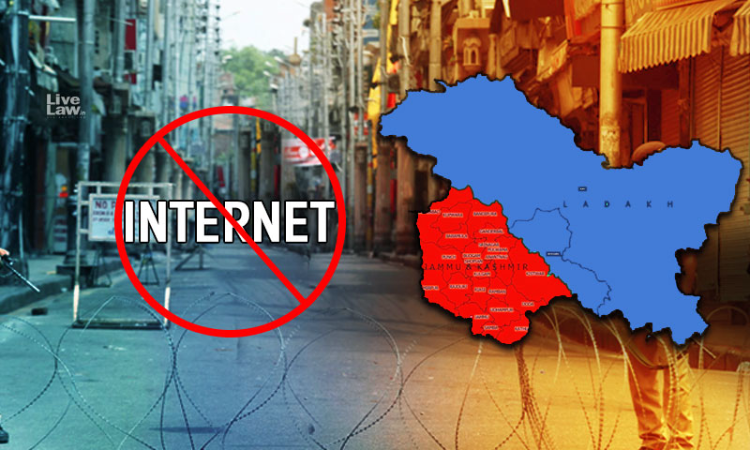Supreme Court And Restoration Of 4G In Kashmir: A Disappointment
Prakhar Raghuvanshi
28 May 2020 10:42 AM IST

The Supreme Court of India (SC) on 11th May 2020 refused to restore 4G internet services in the Union Territory of Jammu and Kashmir (UT). The order came in response to a petition filed to quash orders restricting internet services to 2G in the UT. The SC vide its judgment in Anuradha Bhasin v Union of India had directed the UT to timely review the internet shutdown order. Accordingly, the administration in the UT lifted restrictions on regular time intervals. Currently, the UT has 2G mobile internet for post-paid customers and verified prepaid customers with access to all websites and fixed-line connection with access to all websites.
The SC in Foundation for Media Professionals v UT of Jammu & Kashmir (the order) on 11th May 2020 constituted a Special Committee comprising of Home Secretary; Secretary to Ministry of Communications, Government of India; and Chief Secretary of the UT. The Special Committee will be headed by Home Secretary. The order disregards the case of the petitioners on various points. The following paragraphs will address the contradictions/flaws in the judgment.
Educational needs of the people of the Kashmir valley is a crucial point which ought to have been considered by the court. The restricted 2G services provided in the UT is stifling education given the ongoing COVID-19 pandemic outbreak. Downloading an MS-word document containing about 2000 words takes about 4-5 minutes. In such circumstances, online education or e-learning is a far-fetched idea for students in institutions as well as those preparing for competitive exams. Numerous educational institutions, as well as private players, conduct webinars through Zoom/Webex across India, unfortunately, the students of the valley are deprived of it. The court has erred here as firstly, it takes the government submission on face value and does not question its validity. Secondly, the court never delved into the question of educational needs. The order discusses the submissions on behalf of petitioners (paragraph 4-5) as well as the UT (paragraph 8). However, it never, in the entire order, came back to the question of educational need.
Even if the SC took the submission on behalf of the UT to be prima facie true, it inherently flawed and logically questionable to equate DD national and radio telecasting with the mainstream e-learning methods and platforms.
The primary defence given by the UT was the rise of infiltration, militancy and indoctrination in the UT through the internet as a medium. There are two objections to this position, viz this could be prevented by restricting internet services in the areas where activities of such nature are being carried out or are rising, a gag order is disproportionate in nature. Moreover, the activities mentioned by the UT can be carried over 2G services only. These activities are primarily linked with communication, which is possible over 2G services, thus, there is no justification for the continued denial of 4G services in the state.
The order has agreed with the petitioner's claim that suspension of internet services or reduced speed must be territorially restricted and must be temporary in nature (paragraph 16). In addition to this, the SC has stated in paragraph 17 of the order –
"In view of the observations made in Anuradha Bhasin [v Union of India], for meaningful enforcement of the spirit of the judgment, inter alia, the authorities are required to pass orders with respect to those areas, where there is absolute necessity of such restrictions to be imposed, after satisfying the directions passed earlier" (emphasis supplied)
However, in the paragraphs that follow, the court has referred to and aligned with compelling state interest including modern terrorism, cyberterrorism and militancy. Indeed, these are compelling state interest but the error lies in consecutive paragraphs as the court after stating that 'orders restricting internet must be territorial as well as temporary', completely ignores the plight of the petitioners based on legitimate grounds. The order in my view is self-contradictory, flawed and per incuriam as it fails to apply the law laid down in Anuradha Bhasin's case.
The order instead of directing the UT to constitute a Review Committee as per Rule 2(2) of the Telecom Suspension Rules, 2017 has directed to constitute a Special Committee as the issues involved affect the state and the nation. Earlier, in 2018 Rafale Verdict, the SC instead of directing the registration of FIR and probe by CBI reviewed the contract prematurely.
In addition to this, the court in paragraph 14 of the order has stated "..it might be desirable and convenient to have better internet in the present circumstances.." (emphasis supplied). The words used in the order are prima facie indicative of the seriousness with which the matter was dealt with. In the present circumstances, it is a necessity to have 3G/4G internet services. The order has been passed without considering the gravity of fundamental rights/human rights violations involved.
Finally, there are some unaddressed contentions, viz firstly, the unavailability of the internet to some extent rather than solving the problems of incitement/indoctrination facilitate it as it closes a source to cross-check the received information. Secondly, merely stating that there a compelling state interest will never be enough reason to deprive millions of people of the basic civil liberties and human rights. Considering the outbreak of COVID-19 life is currently more dependent on the internet. Thus, lesser restrictive means must be adopted. For instance, reducing speed in select areas, blocking particular websites and ban on unverified connections. Thirdly, information warfare in the 21st Century is practised by nation-states across the globe, restricting internet services in a way that results in deprivation of human rights can never be an effective and suitable way to tackle the same.
Views Are Personal Only.


